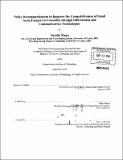| dc.contributor.advisor | Edgar Blanco. | en_US |
| dc.contributor.author | Maya, Natalia (Natalia Carolina Maya Ortiz) | en_US |
| dc.contributor.other | Massachusetts Institute of Technology. Technology and Policy Program. | en_US |
| dc.coverage.spatial | s-ck--- | en_US |
| dc.date.accessioned | 2011-04-04T16:21:19Z | |
| dc.date.available | 2011-04-04T16:21:19Z | |
| dc.date.copyright | 2010 | en_US |
| dc.date.issued | 2010 | en_US |
| dc.identifier.uri | http://hdl.handle.net/1721.1/62066 | |
| dc.description | Thesis (S.M. in Technology and Policy)--Massachusetts Institute of Technology, Engineering Systems Division, Technology and Policy Program, 2010. | en_US |
| dc.description | Cataloged from PDF version of thesis. | en_US |
| dc.description | Includes bibliographical references (p. 133-138). | en_US |
| dc.description.abstract | Half of the Colombian population lives in regions dependent on primary activities such as agriculture, livestock, and fishing. This sector is characterized for being a mix of two kinds of productive systems: large-scale commercial enterprises and small-scale peasant farms. It is estimated that peasants comprise around a third of Colombia's population, contribute more than 60% of the agricultural production and around 30% of the livestock production. The amount of direct consumption goods that come from small scale producers goes from 22% to 65%, depending on the product. Despite its economic and social relevance, small-scale agriculture receives less attention from the government than the large-scale agriculture. This is reflected in the lack of policies aimed to help improve the competitiveness of small-scale farmers. Over the last decade, Information and Communication Technologies (ICT) have been recognized by their impact in the development of countries, and their incorporation in strategies to help the agriculture sector is considered essential. Unfortunately, just large-scale production systems have been able to take advantage of the advantages of an ICT-supported development paradigm. The goal of this thesis is to make policy recommendations as to how ICT could effectively stimulate the development of small-scale agriculture. In order to do this an analysis of the food market supply chain is conducted, including learnings from two detailed cased studies in major markets in Colombia (Bazurto and Corabastos). This thesis argues that, in order to overcome some of the current challenges of small-scale agriculture, a systemic view of the food supply chain system is needed. Traditional approaches like local regulation, infrastructure "modernization" and disintermediation, tend to be myopic and are unable to achieve long-term impact. A description of the multiple actors and stakeholders of the small-scale agricultural supply chain is presented, alongside with learnings of successful (and failed) ICT strategies. Specific policy recommendations are made that aim, through the use of mobile technologies, to improve the coordination among the different supply chain agents. | en_US |
| dc.description.statementofresponsibility | by Natalia Maya. | en_US |
| dc.format.extent | 138 p. | en_US |
| dc.language.iso | eng | en_US |
| dc.publisher | Massachusetts Institute of Technology | en_US |
| dc.rights | M.I.T. theses are protected by
copyright. They may be viewed from this source for any purpose, but
reproduction or distribution in any format is prohibited without written
permission. See provided URL for inquiries about permission. | en_US |
| dc.rights.uri | http://dspace.mit.edu/handle/1721.1/7582 | en_US |
| dc.subject | Engineering Systems Division. | en_US |
| dc.subject | Technology and Policy Program. | en_US |
| dc.title | Policy recommendations to improve the competitiveness of small scale farmers in Colombia through Information and Communication Technologies | en_US |
| dc.type | Thesis | en_US |
| dc.description.degree | S.M.in Technology and Policy | en_US |
| dc.contributor.department | Massachusetts Institute of Technology. Engineering Systems Division | |
| dc.contributor.department | Technology and Policy Program | |
| dc.identifier.oclc | 708359658 | en_US |
